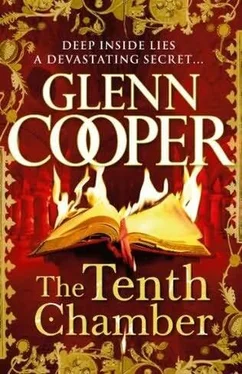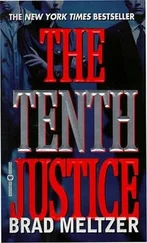Glenn Cooper - The Tenth Chamber
Здесь есть возможность читать онлайн «Glenn Cooper - The Tenth Chamber» весь текст электронной книги совершенно бесплатно (целиком полную версию без сокращений). В некоторых случаях можно слушать аудио, скачать через торрент в формате fb2 и присутствует краткое содержание. Жанр: Триллер, на английском языке. Описание произведения, (предисловие) а так же отзывы посетителей доступны на портале библиотеки ЛибКат.
- Название:The Tenth Chamber
- Автор:
- Жанр:
- Год:неизвестен
- ISBN:нет данных
- Рейтинг книги:3 / 5. Голосов: 1
-
Избранное:Добавить в избранное
- Отзывы:
-
Ваша оценка:
- 60
- 1
- 2
- 3
- 4
- 5
The Tenth Chamber: краткое содержание, описание и аннотация
Предлагаем к чтению аннотацию, описание, краткое содержание или предисловие (зависит от того, что написал сам автор книги «The Tenth Chamber»). Если вы не нашли необходимую информацию о книге — напишите в комментариях, мы постараемся отыскать её.
The Tenth Chamber — читать онлайн бесплатно полную книгу (весь текст) целиком
Ниже представлен текст книги, разбитый по страницам. Система сохранения места последней прочитанной страницы, позволяет с удобством читать онлайн бесплатно книгу «The Tenth Chamber», без необходимости каждый раз заново искать на чём Вы остановились. Поставьте закладку, и сможете в любой момент перейти на страницу, на которой закончили чтение.
Интервал:
Закладка:
Heeding advice from his senator friend, he glossed over the enigmatic Ruac manuscript to keep the high-level assembly focused on one issue at a time. And taking further advice, he liberally used the term, ‘Spectacular New National Monument’.
The importance of having another Lascaux and Chauvet from the perspective of international prestige and local economic development wasn’t lost on the group. Maurice Barbier was moved to a state of excitement that appeared to border on illness. Red-faced and nearly trembling, he declared that an emergency order would have to be immediately drawn up designating the cave a Historic Monument. A commission would be established to determine correct procedures and methodologies and to select the leadership of the excavation campaign.
At this, Abenheim, who had been silently scowling during Luc’s presentation, piped up and began to make the case for direct Ministry involvement, the implication being that he ought to head such a commission and personally take charge of the excavation of this new cave. Luc simmered at the unctuous performance. Abenheim was of Luc’s generation, a couple of years older, certainly as well credentialed in academic archaeology but, unlike Luc, he was not a field man. Luc viewed him as an autocratic bureaucrat, more like a pale, scrawny accountant than an archaeologist. Luc loved shovels and picks and the sun on his back. Abenheim, he imagined, had an abiding affinity to telephones and spreadsheets and fluorescent-lit government offices. Abenheim, for his part, undoubtedly saw Luc as a glory-seeking swashbuckler.
Barbier deftly deferred any discussion of leadership and urged the group to consider for now only the larger issues at hand.
The Minister took charge and crisply gave her assent to the protection order and the granting of emergency funds. She instructed Barbier to forward his recommendations on a commission and asked to be kept informed of all developments. And with that, the meeting was over.
Luc left the room whistling cheerfully through the marble corridors of power. Outside in the sunshine, he yanked off his necktie, tucked it into his pocket and went to meet Hugo near the Louvre for a celebratory dinner.
For a bureaucracy as Byzantine as the Ministry of Culture, the follow-through was executed at breakneck speed. Luc breathed easier when Barbier informed him two weeks later that the newly formed Ruac Cave Commission had designated Luc as the director of the excavation, with only a single dissenting vote. ‘You don’t have to guess who that was,’ Barbier joked, but urged Luc to try to keep Abenheim well informed and happy, if only to make Barbier’s life easier.
Then Barbier added in a tone panged with jealousy, ‘You’ll be made a Knight of Arts and Letters, you know. It’s only a matter of time.’
Luc replied sardonically, ‘If I have to wear a suit and tie for that, I’m not so keen.’
Within a week a military-style operation was loosed upon the Vezere valley. A detachment from the French Engineers Corps backed up by the local gendarmerie accompanied Luc to the Ruac cliffs where a massive bank-grade titanium gate was bolted into the rock face over the mouth of the cave. Power cables were dropped from the top of the cliff, closed-circuit cameras were installed, a prefab guard hut and Portaloos were placed in the woods above the site and sturdy aluminium cliff ladders with railings were hung over the edge providing easier access than trekking along the ledges.
When the convoy noisily rumbled through Ruac, Luc could see faces suspiciously peeking through lace curtains. Outside the cafe, the white-haired owner halted his sweeping, leaned on his broom and scowled into Luc’s slow-moving Land Rover with an irritable flicker of recognition. Luc resisted the boyish impulse to shoot the old man the finger but he did, as he would later regret, lay down a wickedly obvious wink.
After the cave was shuttered and padlocked, Luc had his first restful sleep since the night of discovery. He’d been sick with worry over the threat of leaked information, vandalism and looting. That was behind him now.
The work could begin.
Yet, it was well into the autumn before a full-scale campaign could begin. One couldn’t just snap one’s fingers. There was a team to assemble, schedules to clear, equipment to sort out, accounts to establish, accommodations to arrange.
That last task, as mundane as it was, proved difficult. Luc was determined to find local accommodations, preferably in Ruac. Nothing frustrated him more than losing valuable time commuting to a dig. He was advised to contact the Mayor of Ruac, a Monsieur Bonnet, to see if there were houses that might be rented. Failing that, permission to set up caravans and tents in a farmer’s field with some access to water would suffice. He wasn’t against roughing it. In fact, camping improved the camaraderie in these kinds of enterprises. The lack of creature comforts usually begat a useful sort of bonding.
It was, to say the least, unpleasant to learn at the last possible moment that the mayor and the white-haired owner of the cafe were one and the same.
Bonnet pointedly sat Luc down at the identical plastic-clad table as before and wordlessly listened to his pleas with his meaty arms tightly folded as if he was keeping his guts from spilling out.
Luc employed every rhetorical arrow in his quiver: the mayor would be helping his cafe, his town, his country. His diggers would be good and respectful neighbours. He’d arrange for a personal tour of this marvellous new cave; if there was a Madame Mayor, she could most definitely come too. Surely, the mayor must be curious what all the fuss was about? Surely. As Luc doggedly pressed ahead with his one-sided conversation the mayor’s unshaven jaw remained fixed.
Luc wished he could have taken that wink back.
When he was done, Bonnet shook his head and spat out, ‘We like our peace and quiet in Ruac. No one here is interested in your precious cave. We’re not interested in your studies. We don’t want tourists. There’s no place for you to stay, monsieur.’ With that, he got up and left for the kitchen.
‘That went well,’ Luc muttered to himself on his way out the door.
A couple of dull-looking teenagers held their ground on the pavement, forcing Luc to step off into the road. They sniggered over his forced detour.
He was in the mood for a dustup, and had a fleeting vision of beating the daylights out of them. But he held his tongue and his temper and angrily climbed into his Land Rover. At least his window hadn’t been smashed again, he thought bitterly, as the village disappeared in his rearview mirror.
Thankfully, Abbot Menaud came to the rescue. There was a level, well-drained field on abbey grounds located behind the old stables, tucked enough out of the way that the monks and the archaeologists would hardly notice each other. He wanted no compensation, although he added a humble request to visit the cave when it wasn’t terribly inconvenient.
On a windy Sunday in October, the Ruac Cave team began arriving one by one at the abbey campsite. Luc had been there for a week with two of his graduate students, Pierre, a Parisian originally from Sierra Leone, and Jeremy, a Brit with a broad Manchester accent. They made an unlikely pair, Pierre, black as onyx, tall and athletic and Jeremy, colourless and puny, but they shared a schoolboy sense of humour and were grateful to be involved in something historic. They worked tirelessly setting up the camp and preparing a good welcome for the team.
Caravans were dispersed in a giant circle, like an Old-West wagon train protecting itself from attack. Each senior team member would have his or her own caravan, junior members would double-up and grad students would triple-up. Undergrads would have to make do with tents on the periphery. The caravans had reasonably comfortable bunks and the deluxe ones had small sitting areas with built-in desks. There was no electricity but each unit had a couple of mantle lamps. It was all very well thought-out and properly hierarchical.
Читать дальшеИнтервал:
Закладка:
Похожие книги на «The Tenth Chamber»
Представляем Вашему вниманию похожие книги на «The Tenth Chamber» списком для выбора. Мы отобрали схожую по названию и смыслу литературу в надежде предоставить читателям больше вариантов отыскать новые, интересные, ещё непрочитанные произведения.
Обсуждение, отзывы о книге «The Tenth Chamber» и просто собственные мнения читателей. Оставьте ваши комментарии, напишите, что Вы думаете о произведении, его смысле или главных героях. Укажите что конкретно понравилось, а что нет, и почему Вы так считаете.












